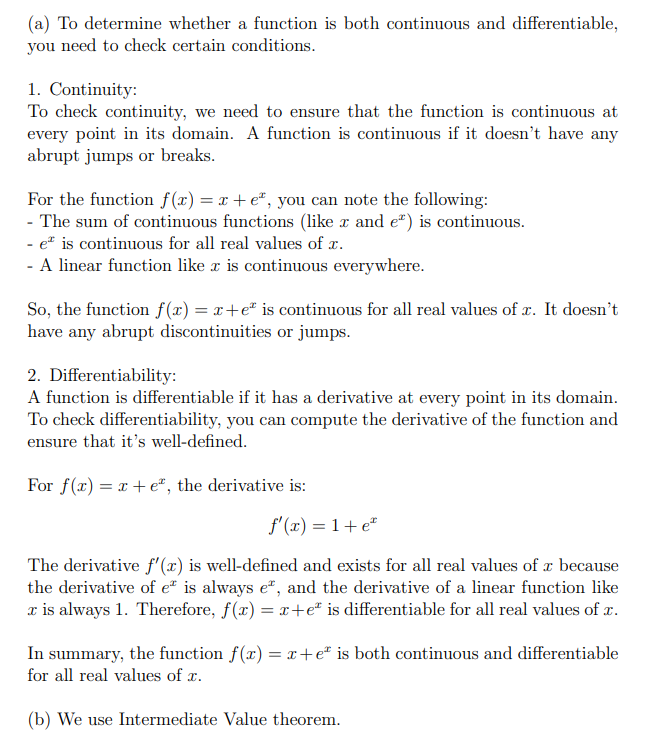Question 2. Our goal is to prove that f(x) = x + e* has exactly one root (i.e. f(x) = 0 for exactly one value of x)." a) First, we really need this function to be both continuous and differentiable. Explain in words how we know this is true. b) Now, let's prove that f(x) has at least one root. What theorem do we need for that? Hint: This is a review problem! We're looking all the way back at section 2.5. c) Use the theorem you stated in part a) to prove that f(x) has at least one root.
Question 2. Our goal is to prove that f(x) = x + e* has exactly one root (i.e. f(x) = 0 for exactly one value of x)." a) First, we really need this function to be both continuous and differentiable. Explain in words how we know this is true. b) Now, let's prove that f(x) has at least one root. What theorem do we need for that? Hint: This is a review problem! We're looking all the way back at section 2.5. c) Use the theorem you stated in part a) to prove that f(x) has at least one root.
Advanced Engineering Mathematics
10th Edition
ISBN:9780470458365
Author:Erwin Kreyszig
Publisher:Erwin Kreyszig
Chapter2: Second-order Linear Odes
Section: Chapter Questions
Problem 1RQ
Related questions
Question
100%

Transcribed Image Text:**Question 2.** Our goal is to prove that \( f(x) = x + e^x \) has exactly one root (i.e., \( f(x) = 0 \) for exactly one value of \( x \)).
a) First, we really need this function to be both continuous and differentiable. Explain in words how we know this is true.
b) Now, let’s prove that \( f(x) \) has **at least one root**. What theorem do we need for that? *Hint: This is a review problem! We’re looking all the way back at section 2.5.*
c) Use the theorem you stated in part a) to prove that \( f(x) \) has at least one root.
d) Now that we’ve proven there is **at least one root**, we will now prove there is **not at least two roots**. We’ll do this using contradiction. Let’s (incorrectly) assume that there are in fact two different roots, and use that to blow up math. The logic here is that if we assume something, and end up breaking math using that assumption, then our assumption should be wrong and we can correctly conclude its opposite.
Let’s call those two roots \( a \) and \( b \). Mean Value Theorem then states that the derivative of \( f(x) \) should equal \(\frac{f(b)-f(a)}{b-a}\) somewhere. What is \(\frac{f(b)-f(a)}{b-a}\) numerically equal to in this case?
e) Calculate \( f'(x) \) and find its range. Does your answer from part d) fall in the range? In other words, even though MVT said this must happen, is it actually true that \( f'(x) \) can attain the value found in part d)?
Expert Solution
Step 1: Solution for (a) and (b)

Step by step
Solved in 3 steps with 2 images

Recommended textbooks for you

Advanced Engineering Mathematics
Advanced Math
ISBN:
9780470458365
Author:
Erwin Kreyszig
Publisher:
Wiley, John & Sons, Incorporated

Numerical Methods for Engineers
Advanced Math
ISBN:
9780073397924
Author:
Steven C. Chapra Dr., Raymond P. Canale
Publisher:
McGraw-Hill Education

Introductory Mathematics for Engineering Applicat…
Advanced Math
ISBN:
9781118141809
Author:
Nathan Klingbeil
Publisher:
WILEY

Advanced Engineering Mathematics
Advanced Math
ISBN:
9780470458365
Author:
Erwin Kreyszig
Publisher:
Wiley, John & Sons, Incorporated

Numerical Methods for Engineers
Advanced Math
ISBN:
9780073397924
Author:
Steven C. Chapra Dr., Raymond P. Canale
Publisher:
McGraw-Hill Education

Introductory Mathematics for Engineering Applicat…
Advanced Math
ISBN:
9781118141809
Author:
Nathan Klingbeil
Publisher:
WILEY

Mathematics For Machine Technology
Advanced Math
ISBN:
9781337798310
Author:
Peterson, John.
Publisher:
Cengage Learning,

